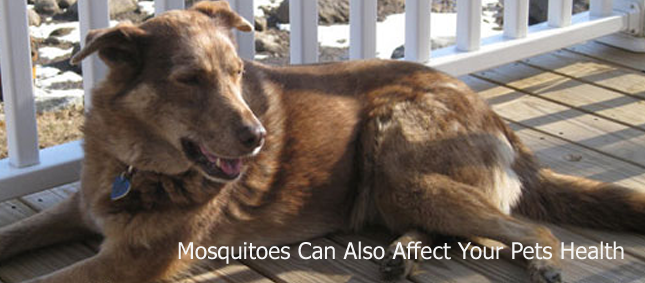Mosquitoes Can Also Affect Your Pet’s Health
Most people are aware that mosquitoes transmit diseases to humans, but did you know that mosquitoes can also cause illnesses in your beloved pet? Some of these conditions include heartworm disease, West Nile virus, Eastern equine encephalitis, and mosquito bite hypersensitivity.
Heartworm
Heartworm is a parasitic infection that can affect dogs and cats. It develops when an infected mosquito transmits heartworm larvae while feeding on a dog. The larvae then travel through the dog’s bloodstream into the heart and lungs, where they will mature and reproduce.
Symptoms: Some pets don’t show any signs of infection, while others experience symptoms, such as trouble breathing, exercise intolerance, and coughing.
Diagnosis: Heartworm can be diagnosed with an enzyme-linked immunosorbent assay (ELISA) blood test or microscopic evaluation of a blood sample.
Treatment and Prevention: Heartworm in dogs is treated with medication, such as Immiticide and Caparsolate. There isn’t currently any medication approved for treating heartworm in cats, but some veterinarians will use off-label drugs to treat the condition. Heartworm can be prevented in dogs and cats with monthly medication, such as Heartgard, Advantage Multi, Interceptor, and Revolution.
West Nile Virus
West Nile virus (WNV) is another mosquito transmitted disease that can affect domesticated animals, including dogs, cats, and horses. After a mosquito feeds on an infected bird, the disease continues to spread through feedings.
Symptoms: Healthy dogs and cats don’t usually show signs of WNV. Puppies, kittens, horses, and animals with weak immune systems on the other hand, are more likely to be affected by the virus. Symptoms may include neurological problems (weakness, trouble with balance, seizures, etc.), fever, decreased appetite, and lethargy.
Diagnosis: A blood test can confirm WNV in pets.
Treatment and Prevention: Since it is a virus, WNV is mainly treated with supportive care. Although there is only a West Nile Virus vaccine available for horses, you can help prevent the virus from affecting your dogs and cats by minimizing their exposure to mosquitoes.
Eastern Equine Encephalitis
Eastern equine encephalitis (EEE) is a virus that affects horses and humans. The disease results when a mosquito bites an infected bird and then transmits the virus to other animals through feeding. EEE is a serious health condition, with death rates in horses of about 80 percent.
Symptoms: Early signs of the virus include fever, abnormal reactions to sound and touch, and anxiety. Symptoms in the advanced stages of EEE include trouble swallowing, circling, coordination issues, difficulty walking, and paralysis.
Diagnosis: A blood test can determine whether EEE virus is present or not.
Treatment and Prevention: Medication, IV fluids, and other means of supportive care is the only form of treatment available for EEE. There is a vaccine available to help prevent the disease.
Mosquito Bite Hypersensitivity
Some pets are extra sensitive to mosquito bites. Although it may not seem like a big deal, mosquito bite  hypersensitivity can be serious and cause additional health problems to develop.
hypersensitivity can be serious and cause additional health problems to develop.
Symptoms: Dry skin, swelling of the feet, and hair loss are signs of a mild reaction to mosquito bites. Pets with a more severe form of hypersensitivity may experience symptoms, such as hives, swollen face, vomiting, trouble breathing, and fainting. If your dog exhibits any of these symptoms, seek immediate help from your veterinarian.
Diagnosis: A physical exam is usually sufficient to diagnose mosquito bite hypersensitivity. If needed, a blood test can be performed to check for cells that appear with allergic reactions.
Treatment and Prevention: Antihistamines, corticosteroids, epinephrine, and anti-inflammatory drugs are some of the medications used to treat the condition in pets. The only way to prevent an allergic reaction is by keeping your pet away from mosquitoes.






